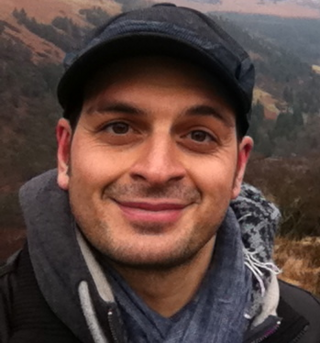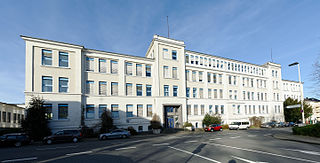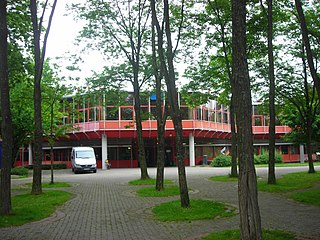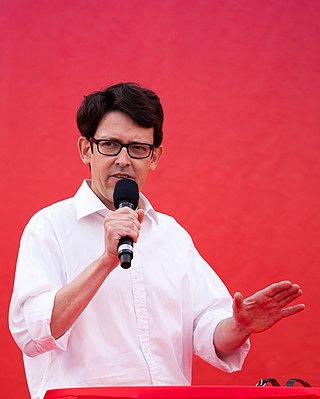
Gymnasium is a term in various European languages for a secondary school that prepares students for higher education at a university. It is comparable to the US English term preparatory high school or the British term grammar school. Before the 20th century, the gymnasium system was a widespread feature of educational systems throughout many European countries.
Grading in education is the process of applying standardized measurements for varying levels of achievements in a course. Grades can be assigned as letters, as a range, as a percentage, or as a number out of a possible total.

The German School of Budapest - Thomas Mann Gymnasium is a private international school in Budapest, Hungary. It was founded in 1908 to serve German families in Hungary. It now has a diverse student body with primarily children of the expatriate business and diplomatic communities. Considered to be one of the best schools of its kind, it was awarded a Certificate of Excellence by the Central Agency for German Schools Abroad in 2012 and again in 2020.

The Spessart-Gymnasium Alzenau is a public scientific-technological, linguistic and humanistic gymnasium in Alzenau, Bavaria. It is named after the Spessart, a wooded range of hills which stretches about 60 kilometers east of the town.

Gymnasium, in the German education system, is the most advanced and highest of the three types of German secondary schools, the others being Hauptschule (lowest) and Realschule (middle). Gymnasium strongly emphasizes academic learning, comparable to the British grammar school system or with prep schools in the United States. A student attending Gymnasium is called a Gymnasiast. In 2009/10 there were 3,094 gymnasia in Germany, with c. 2,475,000 students, resulting in an average student number of 800 students per school.

Martin Ohm was a German mathematician and a younger brother of physicist Georg Ohm.

Kaya Yanar is a German comedian, best known for his comedy show Was guckst du?!.
Germany uses a 5- or 6-point grading scale (GPA) to evaluate academic performance for the youngest to the oldest students. Grades vary from 1 to 5. In the final classes of German Gymnasium schools that prepare for university studies, a point system is used with 15 points being the best grade and 0 points the worst. The percentage causing the grade can vary from teacher to teacher.
The Buber-Rosenzweig-Medaille is an annual prize awarded since 1968 by the Deutscher Koordinierungsrat der Gesellschaften für Christlich-Jüdische Zusammenarbeit (DKR; German Coordinating Council of Societies for Christian-Jewish Cooperation) to individuals, initiatives, or institutions, which have actively contributed to Christian–Jewish understanding. Forty-four different societies belong to the DKR. The name of the prize honors the memory of the Austrian-Jewish philosopher, translator, and educator Martin Buber (1878–1965) and the German-Jewish theologian Franz Rosenzweig (1886–1929). In its inaugural year, the prize was granted to both the historian Friedrich Heer and the Protestant theologian Friedrich-Wilhelm Marquardt.

Suzie Kerstgens is a German singer and lyricist. She is the lead vocalist and co-founder of German pop band Klee.

Albert-Einstein-Schule was a Gymnasium for boys and girls from grades 5–13 in Bochum, Germany. It had about 900 students. Just south of downtown Bochum, the school was in the Wiemelhausen section of town and shared a campus with the Hans Böckler Realschule. The school had an emphasis in natural science and English. It had a bilingual program, where some classes were taught in English, rather than German. In 2008, the school was certified as a "Europaschule" (de) by the Ministry of Schools of North Rhine-Westphalia. The school held its final day of classes on 14 July 2010.

Eberhard-Ludwigs-Gymnasium is a gymnasium in Stuttgart established in 1686. The gymnasium is the oldest in the city, from which many of the others emerged over the years. It is often referred to as ‘Ebelu’, made up of the first few letters of the namesakes names.
Hans-Dietrich-Genscher-Gymnasium Halle is a secondary school (gymnasium) in Germany. It was established in November 1908. Currently, about 600 children attend the school. The school is situated right in the city center of Halle an der Saale and is widely known for its two educational profiles: German secondary school and bilingual English-German profile. In 2009 the school celebrated its 100th anniversary. The school is named after Hans-Dietrich Genscher, a German politician.

The Gymnasium Schwertstraße in Solingen, North Rhine-Westphalia, Germany was established on 15 October 1841 as the Höhere Bürgerschule, and is the oldest and most traditional of the four gymnasiums in the city.

Lycée français international de Simone Veil is a French international school in Düsseldorf. It serves maternelle (preschool) through lycée levels. The school was created in 1962.

Sankt Petri Schule is a German international private school in Copenhagen. The school, one of the oldest in Denmark dating its origins back to 1575, is located opposite St. Peter's Church, the Lutheran parish church of the German-speaking community in Copenhagen. Sankt Petri Schule is a member of the German Schools Abroad Network DAS.

The DFG / LFA Freiburg is a DFG/LFA, a public French-German secondary school in Freiburg im Breisgau, Germany. It offers free education from grades 5 through 12.

The Albert Schweitzer School is a gymnasium in Offenbach am Main in the state of Hesse. It was founded in 1853 and was originally named the Höhere Mädchenschule. It received its current name in honour of Albert Schweitzer in 1956; in the same year the school moved to its current buildings, which were built between 1909 and 1911 for the former Grand Ducal High School. The school has admitted boys since 1957. Since the beginning of 2016, the Albert Schweitzer School has been one of the so-called independent schools. From the Hessian Ministry of Education and Cultural Affairs, the high school received more freedom in the design of lessons and finances.
Frank Bergemann is a German handball coach.

Christian Kleiminger is a German politician and member of the Social Democratic Party of Germany (SPD). He was a member of The German Bundestag from 2005 until 2009.
















